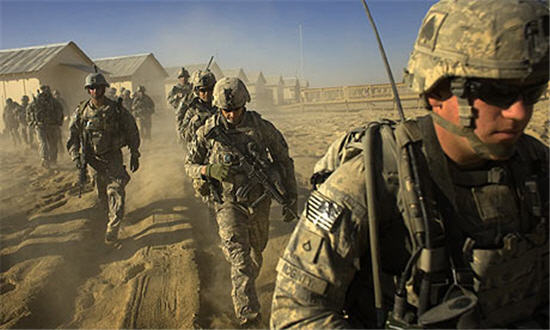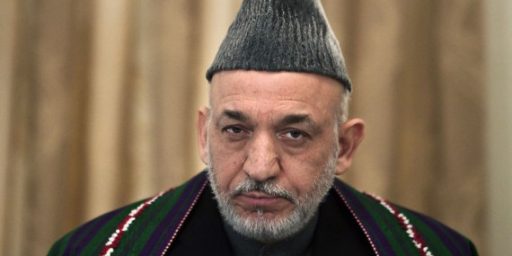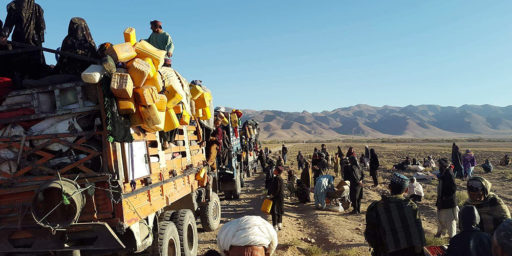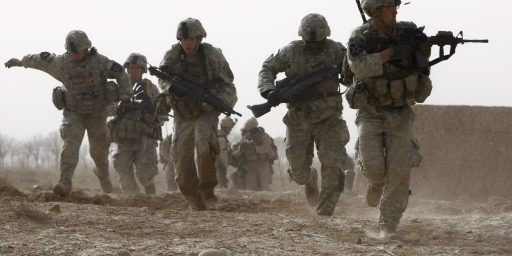U.S. Military Operations Having Little Impact On Taliban
The military surge in Afghanistan appears to be having little impact on the Taliban.
The latest American military buildup in Afghanistan appears to be having little real impact on the Taliban, and there seems to be little concern on their part that it will:
An intense military campaign aimed at crippling the Taliban has so far failed to inflict more than fleeting setbacks on the insurgency or put meaningful pressure on its leaders to seek peace, according to U.S. military and intelligence officials citing the latest assessments of the war in Afghanistan.
Escalated airstrikes and special operations raids have disrupted Taliban movements and damaged local cells. But officials said that insurgents have been adept at absorbing the blows and that they appear confident that they can outlast an American troop buildup set to subside beginning next July.
“The insurgency seems to be maintaining its resilience,” said a senior Defense Department official involved in assessments of the war. Taliban elements have consistently shown an ability to “reestablish and rejuvenate,” often within days of routed by U.S. forces, the official said, adding that if there is a sign that momentum has shifted, “I don’t see it.”
That’s an assessment that sounds fairly grim, especially given the fact that we’ve been in Afghanistan for nine years now and the Taliban seem to be just as resilient against American attacks as they were in the opening years of the war. Yes, we deposed them and kicked them out of Kabul, but once they faded into the hills the task of eradication them, which had somehow become our mission even though it was al Qaeda that supposedly brought us to Afghanistan, proved to be just as difficult as it was for the Soviets facing the mujahadin in the 80s.
One of the biggest problems that the U.S. is facing is the fact that the Taliban has a much longer time horizon than we do:
Among the troubling findings is that Taliban commanders who are captured or killed are often replaced in a matter of days. Insurgent groups that have ceded territory in Kandahar and elsewhere seem content to melt away temporarily, leaving behind operatives to carry out assassinations or to intimidate villagers while waiting for an opportunity to return.U.S. officials said Taliban operatives have adopted a refrain that reflects their focus on President Obama’s intent to start withdrawing troops in the middle of next year. Attributing the words to Taliban leader Mohammad Omar, officials said, operatives tell one another, “The end is near.”
Many will point to this as evidence that the President made a mistake when he announced that the U.S. would begin withdrawing troops from Afghanistan in July 2011, and that is certainly one way to look at it. However, the blunt truth of the matter is that at some level the Taliban know that they can win simply by holding 0ut longer than we do. That’s how the Soviet’s were defeated in the own Afghanistan adventure. It’s how we were defeated in Vietnam. Even if President Obama were to announce tomorrow that the July 2011 deadline was off the table, it seems unlikely that the Taliban would suddenly see that they had no chance, especially since, as stated above, the military attacks themselves don’t seem to be having much of an impact on their positions of power, many of which are protected by Afghan tribal chiefs.
Moreover, deadline or no deadline, the fact remains that we’re fighting a war to defend a nation led by a man who is clearly corrupt and whose own allegiances aren’t necessarily our own. As Faoud Ajami notes, that is as much a reflection of our own position as it is our allies:
A year ago, the U.S. ambassador to Kabul, Karl Eikenberry, laid out the truth about Mr. Karzai and his regime in a secret cable that of course made its way into the public domain. “President Karzai is not an adequate strategic partner,” Mr. Eikenberry wrote. The Karzai regime could not bear the weight of a counterinsurgency doctrine that would win the loyalty of the populace. There were monumental problems of governance but “Karzai continues to shun responsibility for any sovereign burden, whether defense, governance, or development. He and much of his circle do not want the U.S. to leave and are only too happy to see us invest further. They assume we covet their territory for a never-ending war on terror and for military bases to use against surrounding powers.” In Mr. Eikenberry’s cable, Mr. Karzai is a man beyond redemption, who was unlikely to “change fundamentally this late in his life and in our relationship.”
(…)
A big American project, our longest war, is now waged with doubt and hesitation, and our ally on the scene has gone rogue, taking the coin of our enemies and scoffing at our purposes. Unlike the Third World clients of old, this one does not even bother to pay us the tribute of double-speak and hypocrisy. He is a different kind of client, but then, too, our authority today is but a shadow of what it once was.
We are failing in Afghanistan. It’s time to look for a way out.







“We are failing in Afghanistan. It’s time to look for a way out.”
That seems unduly negative.
We are treading water in Afghanistan.
We are failing in Afghanistan. It’s time to look for a way out.
“The surge has failed, the war is lost.” Same gloomy song, different beat. Arm-chair analysts rarely know what’s really going on. I doubt this is an exception.
Listen to the intelligence analysts Juneau, as this report indicates they’re saying that the Afghan Surge isn’t having any real impact on the Taliban
And if you want to talk arm chair analysts, there’s nothing more bush league than thinking that a strategy that more or less worked in one country will automatically work in another, very different, country.
Afghanistan is not Iraq, and thinking that Petraeus can repeat his magic there is the height of foolishness
Cover for Obama all you want but we never had a chance of achieving success with an announced bailout date. Set the date but it should have been one of the closest held secrets, not liberal red meat. You break an enemy army by destroying their will to fight, not by bringing change that gives them hope.
Obviously, choosing to back the wrong criminal was a mistake. So we bail, let him be eviscerated by his “friends” then control the threats via drones and missile strikes.
If you’re referring to Iraq, the “Surge” failed there, too. We haven’t achieved any of the social, political, or military objectives of the Surge, except a decrease in U.S. casualites. All other objectives are unmet.
Correct me if I’m wrong , but the Taliban are basically the militant subgroup of the Pashtun people?
Here is some armchair analysis at it’s best; Short of convincing the Pashtuni they would be more prosperous under a Democratic system (rather than running the joint) and/or convincing the other major ethnic group, who’s name escapes me right now, to stand up to them for control of the country there was not much hope of resolving this successfully. We started strong when we were putting people to work and building schools and so on, and were playing it up to the media, but then we got sidetracked. We also started using drones and causing fairly high collateral “damage” and I’m pretty certain we lost our chance at anything close to a postive outcome.
>You break an enemy army by destroying their will to fight,
And has anyone done that in Afghanistan since Alexander the Great?
anjin-san,
But this time it will be different !
I guess those strikes from drones firing Hellfire missiles are for practice. The killing of their leaders must be doing something Doug. But nay sayers like yourself, I just noticed your picture again which appears just above where I am typing now. You are the personification of a nerd. No f ing wonder your posts are alway the way they are.
The truth of the matter is there are tens of millions of Taliban in the mountain regions and killing them 6 at a time will take far more than this nation is capable or willing to depart with. US funds are being piloted from Pakistan govt. to the very Taliban we are fighting and killing, and who are killing our own soldiers. Obama was handed a morally bankrupt and corrupt military and war, and so far all’s he’s managed to do is to keep the hornets nest buzzing.